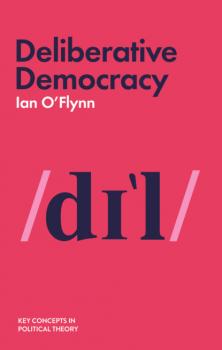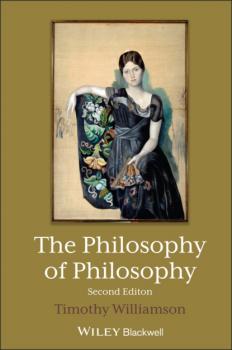ТОП просматриваемых книг сайта:















Афоризмы и цитаты
Различные книги в жанре Афоризмы и цитаты, доступные для чтения и скачиванияАннотация
Today, deliberative democracy is the most widely discussed theory of democracy. Its proponents argue that important decisions of law and policy should ideally turn not on the force of numbers but on the force of the better argument. However, it continues to strike some as little more than wishful thinking. In this new book, Ian O’Flynn examines how the concept has developed over recent decades, the family disagreements which have emerged, and the criticisms that have been levelled at it. Grappling with the familiar charge that ordinary people lack the motivation and capacity for meaningful deliberation, O’Flynn considers the example of deliberative polls and citizens’ assemblies and critically assesses how such forums can fit within a broader democratic system. He then considers the implications of deliberative democracy for multicultural and multi-ethnic societies before turning to the prospects for the most ambitious deliberative project of all: global deliberative democracy. This book will be essential reading for students and scholars of democratic theory, as well as anyone who is curious about the prospects for more rational decision-making in an age of populist passion.
Аннотация
Politik, Linguistik, Philosophie. Beobachtungen aus Wissenschaft und Alltag.
Аннотация
In the first days of spring, birds undergo a spectacular metamorphosis. After a long winter of migration and peaceful coexistence, they suddenly begin to sing with all their might, varying each series of notes as if it were an audiophonic novel. They cannot bear the presence of other birds and begin to threaten and attack them if they cross a border, which might be invisible to human eyes but seems perfectly tangible to birds. Is this display of bird aggression just a pretence, a game that all birds play? Or do birds suddenly become territorial – and, if so, why? By attending carefully to the ways that birds construct their worlds and ornithologists have tried to understand them, Despret sheds fresh light on the activities of both and, at the same time, enables us to become more aware of the multiple worlds and modes of existence that characterize the planet we share in common with birds and other species.
Аннотация
The expanded new edition of one of the most influential and controversial books about the nature of philosophy published in the past several decades The Philosophy of Philosophy presents an original, unified concept of philosophy as a non-natural science. In this provocative work, distinguished philosopher Timothy Williamson challenges widely-held assumptions and clarifies long-standing misconceptions about the methodology and nature of philosophical inquiry. The author rejects the standard narratives of contemporary philosophy developed from naturalism, the linguistic turn, postmodern irony, and other prominent trends of the twentieth century. Viewing the method of philosophy as evolving from non-philosophical pursuits, Williamson provides readers with fresh insight into the “self-image” of philosophy and offers new ways of understanding what philosophy is and how it actually works. Now in its second edition, this landmark volume comprises the original book and the author’s subsequent work. New topics include the recent history of analytic philosophy, assessments of experimental philosophy, theories of concepts and understanding, Wittgensteinian approaches, popular philosophy, naturalism, morally-loaded examples in philosophy, philosophical applications of scientific methods, and many more. This edition features the author’s latest thoughts on a variety of issues, autobiographical reflections, and replies to critics. Proposes an alternative narrative about the nature of philosophy Argues that the common assumption of philosophical exceptionalism is false Highlights the similarities between philosophy and the other sciences in both methodology and subject matter Explores why contemporary philosophy has failed to articulate an adequate methodology Emphasizes increasing the methodological standards of reasoning in philosophy The Philosophy of Philosophy, Second Edition remains essential reading for philosophers, scholars, graduate and advanced undergraduate students in philosophy, and other readers with a sustained interest in the method and rationale of the doing of philosophy.
Аннотация
Die intellektuelle Kopflastigkeit, die über Jahrhunderte mit dem Begriff des französischen Philosophen René Descartes (1596 – 1650) «Cogito ergo sum» («Ich denke, also bin ich») verbunden war, erfordert für den Menschen der Zukunft eine neue Ausrichtung auf die Kraft und Weisheit des Herzens, die mit dem von Roland R. Ropers in die Welt gebrachten Wortes «KARDIOSOPHIE» verbunden ist. Bereits Antoine de Saint-Exupéry beglückte uns mit seiner Erkenntnis: «Man sieht nur mit dem Herzen gut». Der Autor und die sechs Co-Autorinnen beleuchten aus ihrem individuellen Erfahrungsreichtum die Vielfalt von Wissen und Weisheit aus dem Großraum des Herzens.
Аннотация
Dieses Buch verfolgt zwei Ziele: In den Teilen eins bis drei werden die theoretischen Grundlagen für das Verständnis unserer gegenwärtigen Zivilisation erläutert. Es wird erklärt, weshalb ein Kollaps unserer Zivilisation unausweichlich ist, wenn wir nicht schnell unser Geld- und Gesellschaftssystem verändern. In den Teilen vier und fünf folgt ein logisch fundierter Vorschlag, wie wir den drohenden Kollaps vermeiden und eine neue, bessere Zivilisation aufbauen, in der wir als wahrhaft freie Menschen in dauerhaftem Frieden leben werden.
Zeitlich gesehen beginnt das Buch vor mehr als zwölftausend Jahren, als eine gewaltbereite Mafia zur herrschenden Obrigkeit wurde, indem sie von den in ihrem Gebiet lebenden Untertanen unter Androhung von Strafe regelmäßig wiederkehrende Abgaben (Geld) verlangte. Im Gegenzug gewährte die Obrigkeit den Untertanen Freiheit sowie Schutz vor von außen oder innen kommender Bedrohung. Dies ist der Zivilisations-Pakt, der Schlüssel zum Verständnis von Geld und aller bis zum heutigen Tage bestehenden und untergegangenen Zivilisationen.
Im nächsten Schritt wird erklärt, dass Geld seit tausenden von Jahren falsch verstanden wurde und dass heutige demokratische Regierungen nur eine andere Variante der Mafiagruppen sind, die uns seit Jahrtausenden beherrschen und auspressen. Zudem wird dargestellt, wie die Menschheit sich durch die Verstädterung der letzten achtzig Jahre selbst die Lebensgrundlage entzogen hat und warum mehr als 80 Millionen Deutsche verhungern werden, wenn Geld heute seine Funktionalität verliert.
Das Buch endet jedoch nicht mit diesem Katastrophenszenario, sondern mit einem konstruktiven Vorschlag, wie wir wieder selbstständig überleben und uns endgültig von jeder Gewaltherrschaft, auch der demokratischen, befreien können. Hierfür wird ein neues Grundgesetz skizziert, das auf eine DIN-A5-Seite passt und unsere unbeschränkbare Freiheit dauerhaft absichert.
Zeitlich gesehen beginnt das Buch vor mehr als zwölftausend Jahren, als eine gewaltbereite Mafia zur herrschenden Obrigkeit wurde, indem sie von den in ihrem Gebiet lebenden Untertanen unter Androhung von Strafe regelmäßig wiederkehrende Abgaben (Geld) verlangte. Im Gegenzug gewährte die Obrigkeit den Untertanen Freiheit sowie Schutz vor von außen oder innen kommender Bedrohung. Dies ist der Zivilisations-Pakt, der Schlüssel zum Verständnis von Geld und aller bis zum heutigen Tage bestehenden und untergegangenen Zivilisationen.
Im nächsten Schritt wird erklärt, dass Geld seit tausenden von Jahren falsch verstanden wurde und dass heutige demokratische Regierungen nur eine andere Variante der Mafiagruppen sind, die uns seit Jahrtausenden beherrschen und auspressen. Zudem wird dargestellt, wie die Menschheit sich durch die Verstädterung der letzten achtzig Jahre selbst die Lebensgrundlage entzogen hat und warum mehr als 80 Millionen Deutsche verhungern werden, wenn Geld heute seine Funktionalität verliert.
Das Buch endet jedoch nicht mit diesem Katastrophenszenario, sondern mit einem konstruktiven Vorschlag, wie wir wieder selbstständig überleben und uns endgültig von jeder Gewaltherrschaft, auch der demokratischen, befreien können. Hierfür wird ein neues Grundgesetz skizziert, das auf eine DIN-A5-Seite passt und unsere unbeschränkbare Freiheit dauerhaft absichert.
Аннотация
Certain philosophers of Antiquity compared the world to a large animal; but if the world were an animal, it would have a skin similar to the skin that envelops each living being and gives it unity. The world is neither an animal nor a machine but an interminable jumble whose destination is nothing other than the maelstrom in which the very idea of the world slips away. The world has no skin other than the turbulence that makes histories, customs, moments of grandeur and decadence. Because it is not a skin, this extension of space-time is much more fragile than the skins that are already always fragile, because everything here touches its extremities. The world is everything that passes between us – ourselves and everything that happens to us, everything that becomes of our contacts, our gazes, our movements; and through referrals from skin to skin, from the fleeting to the immemorial, you reach, without even knowing it, the entire actuality of the world: the act of its existence. This act is made up of works and disasters, splendours, horrors, and catastrophes. As long as it is ours, it is the act of an infinite emergence that is all the sense there is: a sense that incessantly goes from skin to skin and is itself never enveloped by anything. The texts in this volume are all oriented by the concern for what is currently happening to us – we, late humanoids – when we arrive at an extremity of our history, whether this extremity should turn out to be a stage, a rupture, or quite simply a last breath.
Аннотация
Jedes Jahr entsteht eine Flut von Texten zu Friedrich Nietzsche. Mitunter will es dabei scheinen, es sei zwar schon alles zu Nietzsche gesagt worden, aber eben noch nicht von jedem. Dieser Band bietet eine Inventur der internationalen Nietzscheforschung der letzten dreißig Jahre. Präsentiert werden zehn Texte aus dem Zeitraum 1986 bis 2012, die auf beispielhafte Art einen Eindruck geben von den aktuell relevantesten Forschungszugängen. Dabei wird auch die in den letzten Jahrzehnten stattfindende Ausdifferenzierung der Nietzscheforschung berücksichtigt. So wird allen, die angesichts der Vielzahl der Veröffentlichungen zu Nietzsche den Überblick verloren haben, eine nützliche Orientierung geboten.
Аннотация
Das Ressentiment eignet demjenigen, dem die eigene Identität sowie der Wert derselben zutiefst fragwürdig geworden ist und der aufgrund fortwährend scheiternder Selbstbehauptung an einem zutiefst beschädigten Selbstverhältnis leidet. Es äußert sich im verzweifelten wie fehlgeleiteten Versuch, Ohnmacht in Macht und Selbstzweifel in Selbstgewissheit zu verkehren – auf Kosten des ‚Anderen‘, der aufgrund der eigenen Schwäche gar nicht mehr anders denn als Bedrohung wahrgenommen werden kann. Die Feindbildkonstruktion ist daher die zentrale Funktion des Ressentiments, die Freund/Feind-Logik das zentrale Prinzip einer vom Ressentiment versehrten Gesellschaft. Das Ressentiment ist eine Denk- und Gefühlsstruktur, die prädestiniert dafür scheint, von Populisten als Machttechnik instrumentalisiert zu werden. Darum ist die Auseinandersetzung mit ihm – gerade in Anbetracht der teils dramatischen Erfolge des politischen Populismus – für die in die Defensive geratende Demokratie so eminent wichtig.










